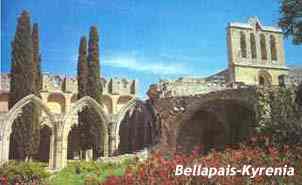Island
in the Mediterranean Sea, off the south coast of Turkey and west coast of
Syria.
Government
Under the 1960 constitution, power is shared between Greek and
Turkish Cypriots, but in 1973 the Turks ceased participating and in 1974
set up a separate community in northern Cyprus, refusing to acknowledge the
Greek government in the south. The Greek Cypriot government claims to be the
government of all Cyprus and is generally accepted as such, except by the
Turkish community. There are, therefore, two republics, each with a
president, council of ministers, legislature, and judicial system. The 'Turkish
Republic of Northern Cyprus' has its own representatives overseas. Greek
Cyprus has a president, elected for five years by universal adult suffrage,
and a single-chamber legislature, the 80-member house of representatives,
also elected for five years. The president appoints and heads a council of
ministers. Under the separate constitution adopted by Turkish Cyprus 1985,
there is a president, council of ministers, and legislature similar to that
in the south. Turkey is the only country to have recognized this government.
History
The strategic position of Cyprus has long made it a coveted territory, and
from the 15th century BC it was colonized by a succession of peoples
from the mainland. In the 8th century it was within the Assyrian empire,
then the Babylonian, Egyptian, and Persian. As part of Ptolemaic Egypt, it
was seized by Rome in 58 BC. From AD 395 it was ruled by Byzantium, until
taken in 1191 by England during the Third Crusade. In 1489 it was annexed by
Venice, and became part of the Ottoman empire in 1571. It came under
British administration in 1878 and was annexed by Britain in 1914, becoming
a crown colony in 1925.
Enosis
In 1955 a guerrilla war against British rule was begun by Greek Cypriots
seeking enosis, or unification with Greece. The chief organization in
this campaign was the National Organization of Cypriot Combatants (EOKA),
and its political and military leaders were the head of the Greek Orthodox
Church in Cyprus, Archbishop Makarios, and Gen Grivas. In 1956 Makarios and
other enosis leaders were deported by the British government. After years of
negotiation, Makarios was allowed to return to become president of a new,
independent Greek-Turkish Cyprus, retaining British military and naval bases.
Greek-Turkish conflict
In 1963 the Turks withdrew from power-sharing, and fighting began. The
following year a United Nations (UN) peacekeeping force was set up to keep
the two sides apart. After a prolonged period of mutual hostility, relations
improved and talks were resumed, with the Turks arguing for a federal state
and the Greeks wanting a unitary one.
In 1971 Gen Grivas returned to the island and
began a guerrilla campaign against the Makarios government, which he
believed had failed the Greek community. Three years later he died, and his
supporters were purged by Makarios, who was himself deposed in 1974
by Greek officers of the National Guard and an Enosis extremist, Nicos
Sampson, who became president. Makarios fled to Britain.
At the request of the Turkish Cypriot leader
Rauf Denktas, Turkey sent troops to the island in 1974, taking control of
the north and dividing Cyprus along what became known as the Attila Line,
cutting off about a third of the total territory. Sampson resigned, the
military regime that had appointed him collapsed, and Makarios returned. The
Turkish Cypriots established an independent government for what they called
the 'Turkish Federated State of Cyprus' (TFSC), with Denktas as president.
In 1977 Makarios died and was succeeded by
Spyros Kyprianou, who had been president of the house of representatives. In
1980 UN-sponsored peace talks were resumed. The Turkish Cypriots offered to
hand back about 4% of the 35% of the territory they controlled and to
resettle 40,000 of the 200,000 refugees who had fled to the north, but
stalemate was reached on a constitutional settlement.
The Turks wanted equal status for the
two communities, equal representation in government, and firm links with
Turkey. The Greeks, on the other hand, favored an alternating presidency,
strong central government, and representation in the legislature on a
proportional basis.
The conflict has been unfortunately turned in to a dilemma because The
European countries always supported their religious-partners (their
secularity is for Christianity it seems and they undercover it by calling it
"the clash of civilizations" recently) even after the Greeks refused
United Nations peace plan. And because the Greek Cypriots were accepted to
the European Union, it is has turned into a blackmail against
Turkey's membership now !




